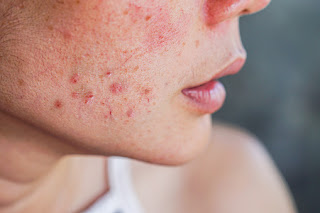What is Acne?
ACNE VULGARIS is a skin condition commonly seen in the teenagers or the persons in their reproductive age.
Acne is defined as the condition in which the skin pores get clogged with the dead skin and sebum, forming papules, nodules or pustules and finally ending up as a scar. In general people refer to it as pimples. Although pimple is a form of presentation of acne vulgaris but we usually take it as pimple in daily life. It may or may not be persistent but the outbreaks of the lesions occur over a specific period of intervals. Scarring is the most disturbing thing as it damages your beauty.
Many of us have experienced acne pimples and sores during our teenage. Let us see all about acne here in this blog post.
What are the signs and symptoms of acne?
Acne-Signs and Symptoms:
 |
| Image Source: Unsplash.com |
- Acne is characterized by the formation of white heads, blackheads and red papules, pus filled pustules or cysts. The excess secretion of oil or sebum from the sebaceous glands results into the clogging of the skin pores.
- Acne vulgaris most commonly appears on face, cheeks, and forehead, front portion of chest and upper back, nose and shoulders. The skin lesions present as:
- Painful nodules (small to large solid hard lumps under the dermis)
- Pus filled cysts
- Red raised bumps of tissues above the skin
- If the condition persists or is left untreated it may become a cause of anxiety and impaired self-image or low self-esteem, low interest in social interaction. Sometimes the condition can worsen up to depression or severe anxiety.
What are the causes and risk factors for acne?
Acne-Causes and risk factors:
The most common cause is genetic factor.
In 80%of the cases the family history of
acne vulgaris is present.
- Age: common in teenagers
- Infection due to the bacteria
- Overproduction of the sebum (hyperactive sebaceous glands)
- Hormonal changes during puberty and reproductive age
- Prior to a week of menstruation many males and females exhibit the outbreak of the pimples and they often go away on their own following the periods
- Lifestyle factors such as overeating fatty foods or dairy products may cause excess release of sebum
- Androgens
- Inflammation of the skin. See also Fungal infections.
What is the treatment of acne?
Acne-Treatment:
Acne is commonly treated by the antibiotics and ointments.
Many physicians advice to use the combination of oral medications (tablets) and topical applications (creams, gels, soaps, ointments, lotions.)
How to prevent acne?
Prevention of Acne: Tips and care:
- Lifestyle modifications: reduce the intake of fatty foods. Add carbs into your diet
- Add ample amount of fresh fruits and vegetables
- Drink plenty amount of water and clear fluids
- Stay away from the junk or deep fried foods
- Avoid exposure to sunlight in summer
- Practice touching your face only after hand washing or at least avoid unnecessary touching your face
- Do not use beauty products without proper knowledge of its content or ingredients.
- Consult your dermatologist and take his advice before applying any unknown ointment or creams
- Avoid bursting the pimples or unclogging the pores as it may worsen the condition even more. Scars result because of breaking off the pustules. The pus comes out and when you touch it elsewhere it may start the formation there.
Aloe vera - Try out the use of Neem leaves as herbs are said to be good in relieving the symptoms.
- Use Ayurvedic soaps and Aloe Vera gels on the affected area.
- Get counselling from an expert to increase self-confidence and self perception.
See your doctor if you have recurrent acne eruptions. You can see an expert dermatologist for your acne problem.
See related posts on Acne:
Note: This blog post is for educational and informational purpose only. It is not a substitute for any medical advice, consultation or treatment. Please see your doctor in any case.


Comments